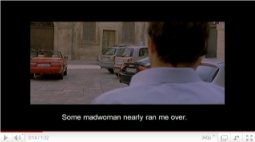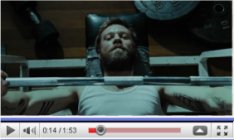Books and Films
Film Reviews
Keep an eye on the European film scene with this week's continental pick.
Five years after How Much Do You Love Me?, Bertrand Blier returns to the silver screen with this tongue-in-cheek parody about cancer. Charles Faulque is a popular, award-winning novelist who has given up writing and taken up drinking since his wife left him with their teenage son. Having fled to his country retreat, he staggers from room to room, clutching an empty glass and an ice bucket containing a bottle of white wine. To make matters worse, he has recently been diagnosed with a malignant growth by a renowned Paris surgeon. The only other occupant of the house is the humble, soft-spoken Louisa, who has waited on his family for close to thirty years. The film starts when a complete stranger turns up at the gate and introduces himself as the embodiment of Charles's cancer. After a few initial doubts, the writer accepts the situation and the two men develop a chatty, congenial relationship verging on the surrreal. The dialogues bear the familiar hallmark of Blier's humour, an appealing blend of sarcasm and impudence. Half-way through the film, an old woman clad in black makes her appearance as Louisa's breast cancer and sets out to ruin her life. Albert Dupontel and Myriam Boyer are impeccably cast as the mischievous tumours and Anne Alvaro gives a wonderful performance as the meek housekeeper who eventually declares her love for Charles. As for Jean Dujardin, who started out in cabaret and on television, his interpretation of the ailing author is a touch histrionic - too much shouting and flailing for me..... I won't give away the end but there's a neat twist that rounds off the story in an unexpected manner. Some critics have pointed out that life-threatening conditions such as cancer are not to be taken lightly but Le Bruit des Glaçons manages to entertain without being disrespectful. Bernard Blier was one of France’s most popular actors; his career stretched over fifty years and his name became closely associated with those of Michel Audiard and Georges Lautner. His son Bertrand's latest feature is a healthy take on one of today's greatest scourges. It should be available on prescription for both cancer victims and hypochondriacs - the perfect antidote to stress. So let's all raise our glasses and toast this new medical satire amidst the gentle clinking of ice....
Imagine a profitable pasta-making concern in a provincial town in southern Italy. Imagine an archetypal family spanning three generations and two live-in servants. There you have the background to Ferzan Ozpetek’s latest gay romp, premiered at the 2010 Tribeca Film Festival. The younger son Tommaso was sent off to Rome to read economics so that he could help his brother Antonio take over the business. In actual fact, he has spent his college years studying literature while entertaining hopes of becoming a writer. His second secret? He has always been gay and now lives with his boyfriend in the Italian capital. After graduating, he arrives back home for a formal dinner attended by the whole family as well as his father’s trusted partner, Signore Brunetti. Tommaso is determined to break the news but his elder brother beats him to it by publicly confessing his homosexuality. Outraged, the patriarch banishes Antonio from the house before suffering a heart attack. Fearful that having two gay sons would deal a fatal blow to Papà, Tommaso postpones telling him the truth and takes on the role of the «good boy». He negotiates with the factory workers, supervises production and visits prospective clients with Brunetti’s charming daughter Alba. Clearly, he is not cut out for the job and realises despite his efforts that he will never find fulfillment surrounded by rigatoni, penne and fettucine. One of the movie’s highlights is when four of Tommaso’s clubbing mates, including his companion Marco, pay a visit to the Cantone family and are given hospitality for a few days. They do their utmost to behave, with the inevitable gaffes and misunderstandings…. Finally, Tommaso lays his cards on the table and comes clean about both his literary ambitions and sexual tastes. At bottom, Mine Vaganti is about being happy and fulfilling one’s dreams. Turkish-born Italian director Ferzan Ozpetek is well known for his interest in the gay community and sexual issues at large (The Turkish Bath, The Ignorant Fairies, Facing Windows, Harem). His latest production is a light-hearted comedy in the Italian style that is guaranteed to raise a smile or two.
In 1998 Danish director Thomas Vinterberg won tremendous critical acclaim for Festen, his vitriolic depiction of a family celebration that collected a string of international awards. It was the first movie made in compliance with Dogme 95, an avant-garde movement instigated by Vinterberg and his compatriot Lars Von Trier. Since graduating from the National Film School of Denmark in 1993, the former has produced a number of features, shorts, telefilms and videos. His latest opus is based on a novel by Jonas T. Bengtsson. The title refers to a method of torture that consists in keeping the victim's head under water. Sombre is the first word that springs to mind when describing Submarino. We follow the troubled lives of two siblings raised by an alcoholic, dysfunctional mother who has left them scarred for life. They also share a dark and terrible secret over which they still harbour strong feelings of guilt. Such a traumatic childhood leaves them no chance of survival. Nick is a violent ex-convict bent on drinking, incapable of securing a steady existence. His younger brother, who remains unnamed throughout the film, is a widowed father whose addiction to heroine jeopardises the loving relationship he enjoys with his son Martin. Although both characters are portrayed as self-destructive, there is an underlying streak of compassion in many of their actions. The result is a heartbreaking story in which two estranged men lead parallel lives in the same city, meeting up briefly only twice - at their mother's funeral and in a prison courtyard, where their fleeting encounter reaches emotional heights. No room for hope in this harsh, uncompromising narrative, subtly rendered by Jakob Cedergren and Peter Plaugborg in the twin roles. Admittedly, this is hardly the best choice if you are seeking light entertainment. However, if you're after a powerful experience blending talent, authenticity and raw emotion, then Submarino will definitely fit the bill.
French helmsman Alain Corneau, who passed away last month aged 67, was an old hand at making thrillers. His greatest achievements in this area were Police Python 357, the devastatingly bleak Série Noire and Choice of Arms, a crime saga that explored morality among gangsters. Sadly, his last cinematic venture is something of a disillusion. This time, the action takes place on the premises of a multinational group specialised in foodstuffs. The plot in brief? The Machiavellian power play between senior executive Christine Rivière and Isabelle, her young and dedicated collaborator. The corporate world is frequently used as a backdrop to human conflict and rivalry: Disclosure, The Firm and Michael Clayton are typical examples of the genre. The subject is so hackneyed that only a stroke of genius could make it worthy of interest. And this is definitely not the case. The whole affair lacks credibility: sparsely-furnished offices smacking of studio sets, shallow dialogues and a murder inquiry on the brink of ridicule with forensic evidence that would have any self-respecting police officer in stitches…. The acting, too, falls short of the mark. Kristin Scott Thomas drifts through the film with the same condescending grin that is quick to exasperate audiences. The blonde Ludivine Sagnier is woefully miscast as her personal assistant: too young, too inexperienced, too immature, she is wholly unconvincing as the smooth operator who eventually gets her way. Don’t waste your money on this colourless story that brings Alain Corneau’s eminent career to a disappointing end.







